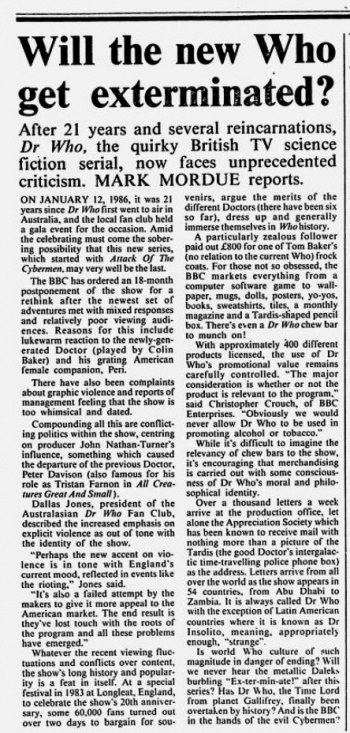Difference between revisions of "Will the new Who get exterminated?"
John Lavalie (talk | contribs) m (Text replacement - "| categories = 1985 hiatus" to "| categories = Hiatus (1985)") |
John Lavalie (talk | contribs) m (Text replacement - "| categories = Hiatus (1985)" to "| categories = Hiatus") |
||
| Line 11: | Line 11: | ||
| type = | | type = | ||
| description = | | description = | ||
| − | | categories = Hiatus | + | | categories = Hiatus |
| moreTitles = | | moreTitles = | ||
| morePublications = | | morePublications = | ||
Latest revision as of 00:02, 17 August 2019
- Publication: The Sydney Morning Herald
- Date: 1986-01-20
- Author: Mark Mordue
- Page: The Guide, p. 3
- Language: English
After 21 years and several reincarnations, Dr Who, the quirky British TV science fiction serial, now faces unprecedented criticism. MARK MORDUE reports.
ON JANUARY 12, 1986, it was 21 years since Dr Who first went to air in Australia, and the local fan club held a gala event for the occasion. Amid the celebrating must come the sobering possibility that this new series, which started with Attack Of The Cybermen, may very well be the last.
The BBC has ordered an 18 month postponement of the show for a rethink after the newest set of adventures met with mixed responses and relatively poor viewing audiences. Reasons for this include lukewarm reaction to the newly-generated Doctor (played by Colin Baker) and his grating American female companion, Peri.
There have also been complaints about graphic violence and reports of management feeling that the show is too whimsical and dated.
Compounding all this are conflicting politics within the show, centring on producer John Nathan-Turner's influence, something which caused the departure of the previous Doctor, Peter Davison (also famous for his role as Tristan Farnon in All Creatures Great And Small).
Dallas Jones, president of the Australasian Dr Who Fan Club, described the increased emphasis on explicit violence as out of tone with the identity of the show.
"Perhaps the new accent on violence is in tone with England's current mood, reflected in events like the rioting." Jones said.
"It's also a failed attempt by the makers to give it more appeal to the American market. The end result is they've lost touch with the roots of the program and all these problems have emerged."
Whatever the recent viewing fluctuations and conflicts over content, the show's long history and popularity is a feat in itself. At a special festival in 1983 at Longleat. England, to celebrate the show's 20th anniversary, some 60.000 fans turned out over two days to bargain for souvenirs, argue the merits of the different Doctors (there have been six so far). dress up and generally immerse themselves in Who history. A particularly zealous follower paid out .C800 for one of Tom Baker's (no relation to the current Who) frock coats. For those not so obsessed, the BBC markets everything from a computer software game to wallpaper, mugs, dolls, posters, yo-yos. books, sweatshirts, tiles, a monthly magazine and a Tardis-shaped pencil box. There's even a Dr Who chew bar to munch on!
With approximately 400 different products licensed, the use of Dr Who's promotional value remains carefully controlled. "The major consideration is whether or not the product is relevant to the program," said Christopher Crouch, of BBC Enterprises. "Obviously we would never allow Dr Who to be used in promoting alcohol or tobacco." While it's difficult to imagine the relevancy of chew bars to the show, it's encouraging that merchandising is carried out with some consciousness of Dr Who's moral and philosophical identity.
Over a thousand letters a week arrive at the production office, let alone the Appreciation Society which has been known to receive mail with nothing more than a picture of the Tardis (the good Doctor's intergalactic time-travelling police phone box) as the address. Letters arrive from all over the world as the show appears in 54 countries, from Abu Dhabi to Zambia. It is always called Dr Who with the exception of Latin American countries where it is known as Dr Insolito, meaning, appropriately enough, "strange".
Is world Who culture of arch magnitude in danger of ending? Will we never hear the metallic Daleks burbling "Ex-ter-min-ate!" after this series? Has Dr Who, the Time Lord from planet Gallifrey, finally been overtaken by history? And is the BBC in the hands of the evil Cybermen"
Disclaimer: These citations are created on-the-fly using primitive parsing techniques. You should double-check all citations. Send feedback to whovian@cuttingsarchive.org
- APA 6th ed.: Mordue, Mark (1986-01-20). Will the new Who get exterminated?. The Sydney Morning Herald p. The Guide, p. 3.
- MLA 7th ed.: Mordue, Mark. "Will the new Who get exterminated?." The Sydney Morning Herald [add city] 1986-01-20, The Guide, p. 3. Print.
- Chicago 15th ed.: Mordue, Mark. "Will the new Who get exterminated?." The Sydney Morning Herald, edition, sec., 1986-01-20
- Turabian: Mordue, Mark. "Will the new Who get exterminated?." The Sydney Morning Herald, 1986-01-20, section, The Guide, p. 3 edition.
- Wikipedia (this article): <ref>{{cite news| title=Will the new Who get exterminated? | url=http://cuttingsarchive.org/index.php/Will_the_new_Who_get_exterminated%3F | work=The Sydney Morning Herald | pages=The Guide, p. 3 | date=1986-01-20 | via=Doctor Who Cuttings Archive | accessdate=21 November 2024 }}</ref>
- Wikipedia (this page): <ref>{{cite web | title=Will the new Who get exterminated? | url=http://cuttingsarchive.org/index.php/Will_the_new_Who_get_exterminated%3F | work=Doctor Who Cuttings Archive | accessdate=21 November 2024}}</ref>
